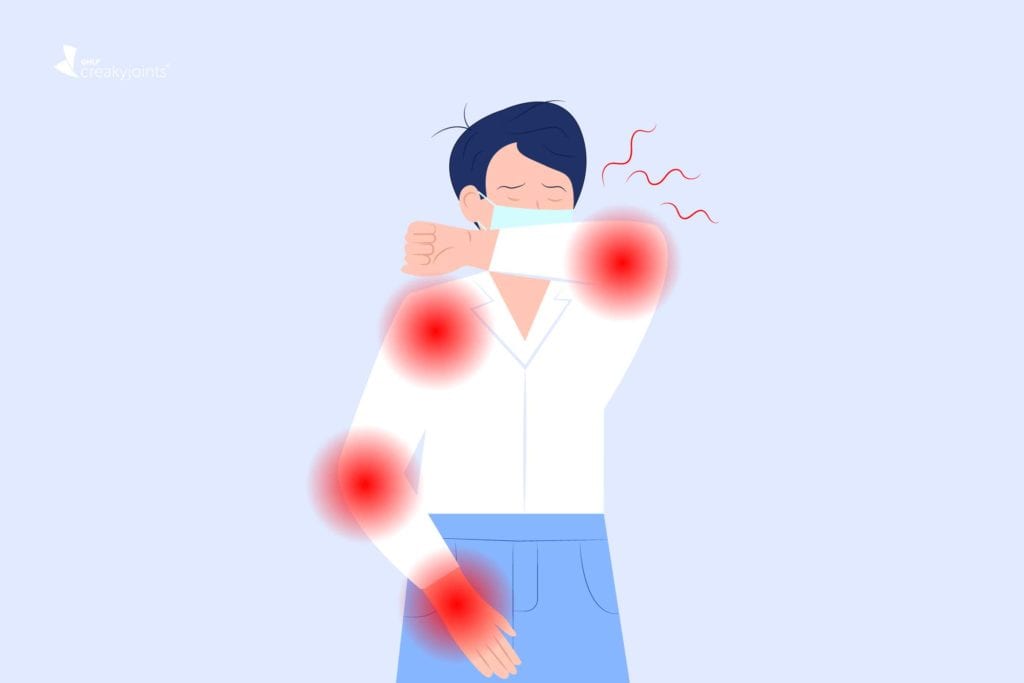This winter has brought unprecedented illness. Coined the tripledemic, this trifecta of COVID-19, influenza (the flu), and respiratory syncytial virus (RSV) has overwhelmed the health care system and caused fear among many of us in the immunocompromised community.
As a family nurse practitioner with rheumatoid arthritis, I work with sick patients daily, one-on-one (yes, often face-to-face), but I’m taking steps to protect myself. Here’s how I keep my immune system strong and stay protected during these pandemic times — hopefully these tips can help you, too.
Keep Warm
First and foremost, I stay warm. I do this by dressing in layers and keeping extra layers of clothing on hand. I have gloves in most coat pockets and blankets in my office, car, and around my home. According to the National Institutes on Aging, older adults lose heat faster. As you age, you also lose signals that tell you when you’re getting cold. Staying warm also helps support your first line of defense — when the nasal passages are cold, they are less able to clear bugs and viruses out.
Stay warm to keep your immune system at its strongest.
Get Vaccinated
Vaccines save lives and help your immune system prepare for an attack. Luckily, there are two vaccines that can help you stay protected this winter: the new bivalent COVID-19 booster shot and your annual flu shot. Ask your health care provider if you’re up to date on the latest vaccines, and tips for timing your shots with your current medications.
Wash Your Hands
We have all heard this from childhood to adulthood, even more during the pandemic, and even more depending if you work in food service, childcare, or health care — wash your hands.
Dating back to 1860, nurse pioneer Florence Nightingale wrote that nurses should wash their hands regularly to prevent the spread of disease. There is a lot of modern research supporting regular hand washing to fight bacteria and viruses. The CDC recommends washing with warm, soapy water for 20 seconds. If you can’t always wash with soap and water, alcohol-based hand sanitizer is very convenient and portable.
Wash your hands often to stop the spread of germs.
Stay Home If You’re Sick
If you’re sick, the best thing you can do to slow the spread of any contagious disease is to stay home and away from other people until you’re better. This is especially important for me, as I’m around people who are immunocompromised and highly susceptible to illness everyday. (This is one possible reason why your appointment may get canceled or rescheduled, so be kind.)
Stay home when you’re sick; your co-workers don’t want to share your germs.
Get Enough Sleep
According to the Sleep Foundation, adults should get an average of seven to nine hours of sleep each night. Sleep is important for your immune system. Sleep deprivation can be associated with poor immune response, chronic inflammation, an increased risk of cancer, autoimmune, and neurodegenerative diseases.
To keep your immune system strong, and give your body time to rest and reset, get enough high-quality sleep each night. Read these tips if you are having more sleep problems after having COVID.
Stay Active
Stay active to strengthen your immune system. This may include walking daily as well as lifting weights two days a week — or simply finding a movement routine that works for you and your symptoms. Check out Krista, a fellow RA warrior, on TikTok. She inspires me and all of her followers to move with chronic pain no matter what limitations or abilities they have.
Stop Worrying
Of course the thought of getting sick can be scary for those of us who are immunocompromised, but worrying will just increase your anxiety and weaken your immune system. Do your best to stay calm and spend your energy controlling what you can this winter flu season.
I proudly serve the medical community everyday, and I do not waste a moment worrying about getting sick. Worrying won’t change the status of my rheumatoid arthritis, but not worrying can give my immune system a fighting chance when I’m exposed.
Be a More Proactive Patient with ArthritisPower
Join CreakyJoints’ patient-centered research registry to track your symptoms, disease activity, and medications — and share with your doctor. Sign up.
Cold Weather Safety for Older Adults. The National Institute on Aging. https://www.nia.nih.gov/health/cold-weather-safety-older-adults.
Common Colds: Protect Yourself and Others. Centers for Disease Control and Prevention. https://www.cdc.gov/features/rhinoviruses/index.html.
Hillier MD. “Using Effective Hand Hygiene Practice to Prevent and Control Infection.” Nursing Standard (Royal College of Nursing (Great Britain): 1987). April 29, 2020. doi: https://doi.org/10.7748/ns.2020.e11552.
How Much Sleep Do We Really Need? Sleep Foundation. August 29, 2022. https://www.sleepfoundation.org/how-sleep-works/how-much-sleep-do-we-really-need.
Ray A, et al. “Stress, Anxiety, and Immunomodulation.” Vitamins and Hormones. Elsevier, 2017. doi: https://doi.org/10.1016/bs.vh.2016.09.007.
Walker A. Just How Bad Is the ‘Tripledemic’? December 2022. The New York Times. https://www.nytimes.com/interactive/2022/12/16/us/covid-flu-rsv-tripledemic-data.html.






